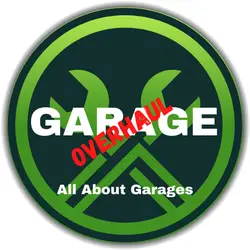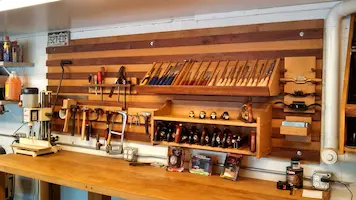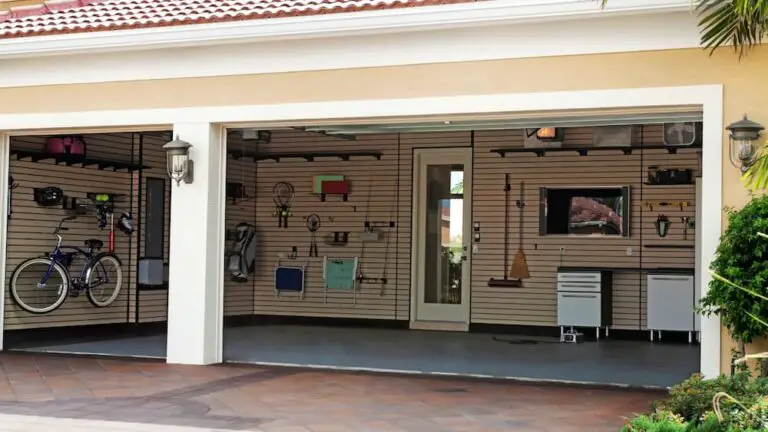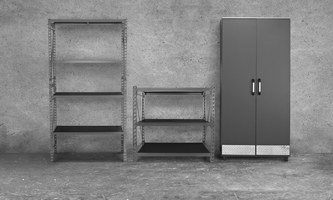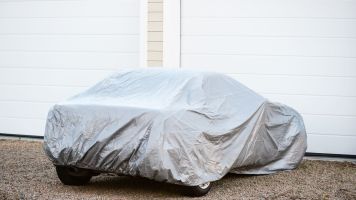What Is Safe to Store in Garage? (And Not)
This post contains affiliate links.
Most of us use our garages to store things. However, that does not mean you can store everything inside. Some things may need more protection, especially if your garage is not insulated. So what is safe to store in the garage?
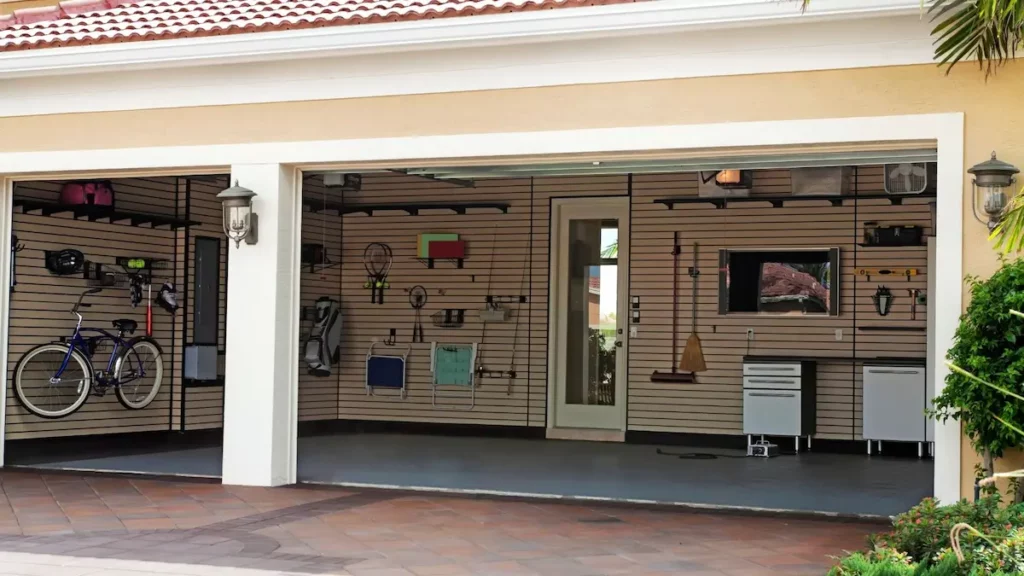
In general, these items are safe to store in a garage:
- Tools
- Car supplies
- Sports Equipment
- Decorations
- Clothes
You want to avoid storing temperature and humidity-sensitive items. These include food, paper, electronics, and more.
This article explores the list of things you can and cannot store in a garage. We assume your garage is not insulated and does not have any climate control.
READ MORE: Should I insulate my garage?
READ MORE: Best Garage Climate Control Systems
What Is Safe To Store In Garage?
| Categories | Examples | Notes |
| Yard & Gardening Tools | -Garden hoses -Hedge trimmers -Pressure washer | -Oil the moving metal parts before storing away. |
| Hand & Power Tools | -Drills -Hammer -Wrenches | -Remove batteries from tools during winter and store in warmer areas. -Oil the moving metal parts before storing away. |
| Car Supplies | -Lubricants -Car wash liquid -Tires | -Store in a safe place – child and pet hazard. |
| Ammunition | -Bullets | -Keep in tightly sealed containers and in a safe place. |
| Sports Equipment | -Bikes -Skateboards -Helmet | -Clean and dry them before storage. -Oil moving parts. |
| Camping Gear | -Hiking boots -Tents -Jackets | -Clean and dry them before storage. |
| Outdoor Toys | -Frisbee -Nerf guns -Trampoline | -Clean and dry them before storage. |
| Christmas & Other Decorations | -Christmas tree -Christmas lights -Decorations | -Store decorations in boxes. -Wrap tree with cling wraps. |
| Clothes & Linen | -Bedsheets -Out-of-season clothing | -Keep in airtight compression bags. |
| Leather Clothes & Furniture | -Leather jackets -Leather seats | -Condition before storage. -Wrap with cling wraps or keep in compression bags. |
| Shoes & Boots | -Work boots -Hiking boots -Riding boots | -Clean and dry before storage. |
| Coolers | -Hard coolers -Soft coolers | -Clean and dry before storage. |
| Gym Equipment | -Dumbbells -Racks -Mats | -Lubricate moving parts. |
| Second Fridge | -Garage fridges -Mini fridges | -Get a garage fridge for better performance. |
Yard & Gardening Tools
Assuming your house has yards and a garden, you should have one or two of these tools.
It may be a good idea to store them systematically, such as by having a tool board. This allows you to keep these tools within reach. It could also be great to clean and oil the moving parts before storage.
Hand & Power Tools
At the most basic, you should have a screwdriver or two lying around. More serious folks may have power drills, pressure washers, or power saws in the garage.
Take good care of them by cleaning them regularly. You should also oil moving parts whenever possible. Oil helps to keep the machines working smoothly and protects them from rusting.
If you live in areas where the winter is brutal, consider removing the batteries from your tools. Keep them inside your home instead. Very low temperature is bad for lithium batteries and may shorten their life.
Car Supplies
Car supplies include the tools, fluids, and accessories you use to keep your car in good condition. They could be lubricants, coolants, waxes, rubber tires, wiper fluid, etc.
Some of these items are large and may require changing occasionally. For example, tires. These should be ok stacked at the corner of your garage. Just make sure to cover them to keep the dust away.
The fluids can be a child and pet hazard, which means you want to keep them safe. Antifreeze, for example, may smell sweet and attractive to dogs. Consider putting them away in cabinets with lockers.
READ MORE: Best Garage Cabinets
Ammunition
We commonly keep our ammunition with our guns, but perhaps you may keep spares in the garage. Ammunition should be treated with care, as it can take away lives in the wrong hands.
This means you should at least keep them in boxes and inside a container so they are not visible to the eye. You also want to keep them safely locked in a cabinet too.
Sports Equipment
Sports equipment are hard objects. They should be fine staying in the garage and dealing with the summer heat and winter cold.
The key is to clean and dry them before storing them away. This keeps them fresh and in good condition for you to use later.
Camping Gear
Camping or outdoor gear is designed to deal with the outdoors. They will do fine in your garage if they can handle the outdoors.
Similar to sports equipment, clean and dry them before storage. If they have moving parts, ensure to lubricate them to prevent rusting.
Outdoor Toys
Outdoor toys such as Frisbee or trampoline may be great during the summer. However, they should stay indoors during the winter.
Take some time to clean them before storage. With larger toys such as the trampoline, consider disassembling them before storage.
Christmas & Other Decorations
Christmas and celebration decorations can be small. They can be hazardous to children. They also tend to be fragile, so you want to use a box to store them. Keeping them in plastic containers with silica gel can also protect them from moisture damage.
As for the trees, you can cling-wrap them before storing them away. This should prevent the tree from becoming too dusty.
READ MORE: Garage christmas decorations
Clothes & Linen
You would have clothes and linen in your garage, especially the off-season ones. Please wash and dry them, and then pack them in airtight storage bags. Maybe slip in a dryer sheet too.
Your clothes and linen will smell fresh and great when you open them up when the season changes.
Leather Clothes & Furniture
Leather is generally a tough material. They should do very well in the garage. The key is to condition and prevent them from collecting dust.
You can do that by first applying some leather cream. Then you can either keep them in airtight bags. For items such as furniture, you can always cling-wrap them.
Shoes & Boots
Shoes and boots are also tough and hardy, so they should work fine in your garage. However, animals such as spiders are known to love them. Keeping them in shoeboxes, or at least a container, may make sense.
Coolers
Coolers are amazing during the summer. However, they probably sit away in storage during colder months. Before storing them away, consider clearing and drying them first. You can also cling wrap them to avoid them picking up dust.
Gym Equipment
If you find it hard to leave home to go to the gym to pump some iron, consider building your own home gym. Most gym equipment is designed to be tough, which means they should do fine in your garage.
Second Fridge
If you plan to have a fridge, consider a garage fridge. These fridges have additional thermostats that can help work well in winter. The regular fridge may not perform well in the garage, especially if not insulated or heated.
Things You Should Not Store In Garage
| Categories | Examples | Notes |
| Propane Tank & Gas | -May leak in hot temperature. | |
| Paper & Cardboards | -Documents. -Photographs. | -Sensitive to moisture, and temperature changes. |
| Foodstuff | -Canned food. -Preserved food. | -Sensitive to temperature changes. -May spoil or freeze over. |
| Alcohol | -Wine. -Beer. | -May freeze in winter, spoil in summer. |
| Vinyl Records, Discs | -Vinyl. -DvD. | -Sensitive to moisture, and temperature changes. |
| Electronics & Appliances | -Old smartphones. -Old blenders. | -Sensitive to moisture, and temperature changes. |
| Paint | -Wall paint | -May freeze over winter, and dry over summer. |
| Batteries | -Dry cells. -Rechargeable batteries. | -Cold temperature can be bad for batteries. |
| Firewood | -Chopped firewood. | -Critter magnet. |
| Wood & Antique Furniture | -Dresser. -Tables. | -Humidity and temperature changes are bad for wood. |
Propane Tanks & Gas
Propane tanks or gasoline are a bad idea in the garage. This is because the gas inside may expand during the extreme heat in the summer. This may cause leakage. Excessive leakages may be a fire hazard and can cause explosions or spontaneous combustion too.
Keep any extra propane tank or gas jerry cans in a well-ventilated area away from the sun. You can also build a proper propane and gasoline storage area too, by fencing up your shed.
Paper & Cardboard
Paper products and cardboard boxes can be sensitive to temperature fluctuations. However, the biggest harm may come from a garage’s damp environment.
They may discolor, deform, or dampen your papers, books or magazines. The binding glue used to make cardboard or books may also attract bugs.
This means you want to keep your important records or photographs away from the garage. Store them indoors instead. If you really need to use the storage space in your garage, consider using plastic storage bins (paid link), with silica gel inside to suck up moisture.
Foodstuff
Generally, food storage in garages is a bad idea. Food generally does not stand up to the garage well due to moisture and temperature fluctuations. Generally, you want to keep foodstuff in the kitchen, not the garage.
Fresh food should be in your fridge. This prevents them from spoiling quickly and keeps the rodents and pests away. The same goes for your pet food; keep them in the kitchen instead.
You also want to avoid the garage for things such as canned food. Anything under 70°F (21°C) shortens the canned food’s lifespan. They also spoil quickly once over 95°F (35°C.)
The best temperature for canned food is between 33.8°F (1°C) to below 85°F (29.4°C), with humidity below 15% if possible. Also, avoid direct sunlight as well.
Alcohol
Alcohol is also not a good idea in garages. Canned drinks such as beer may freeze over in the winter. The temperature changes may also cause them to not last as long.
Humidity in the garage may also spoil and damage the cork on your wine or liquor bottle. Moisture may get in and change the color of wine. The taste of wine may also be affected. It may be better to keep your alcohol in the kitchen instead.
Vinyl & Discs
Vinyl and discs generally may not withstand moisture and temperature changes. Moisture may encourage mold growth, damaging the surface of pieces of vinyl and CDs. They can end up becoming unreadable.
Electronics & Appliances
Electronics and appliances are delicate items. They are also sensitive to moisture and extreme temperature changes. Moisture degrades the soldering on the circuit boards, and may encourage rusting in finer parts.
Temperature changes may cause expansion and contraction. Over time, the devices may crack. If you prefer to keep these items in a garage, keep them in storage containers and add silica gel to dry the insides.
READ MORE: Best Garage Storage Bins
Paint
Paint can also be sensitive to temperature changes and excessive moisture. Paint may freeze or be unusable over winter. During summer, they may run dry easily too. If your paint is not mold-proof, it may also become moldy due to moisture.
It may make sense to store your paint indoors, such as in your indoor storage or basement instead.
Batteries
Batteries degrade much faster in higher and colder temperatures. They also may leak since summer heat may cause the insides to expand.
This means you want to keep them away from your garage, especially during the peak of summer and winter. Store them indoors instead.
Firewood
Firewood can become damp if stored in garages for too long. Firewood’s rough surface also makes it easy to pick up dust. They are also a fire hazard since they can catch fire easily.
Firewood may also attract critters, bugs, or, worse, termites. Consider storing your firewood in an open shed instead. Cover them with a tarp if you still need to keep them indoors.
Wood & Antique Furniture
Moisture and temperature changes can wreak havoc on wood. Moisture causes molding and may cause wood to deform. Temperatures can also cause wooden furniture to contract and expand.
Ultimately, you may have warped, delaminated, or deformed furniture. Always keep wood or patio furniture indoors to ensure they stay in good condition.
Wrapping Up
To summarize, avoid storing things sensitive to temperature and moisture in your garage. You also want to avoid keeping precious items in the garage.
Hardier items may be better in the open, shaded places such as sheds. More sensitive items should, of course, stay indoors.
Whenever possible, put some protection on your items before storing them away. You can use a container, cling wrap, bags, or tarps to protect them. These protections should protect your items from dust, excessive moisture, or bugs.
